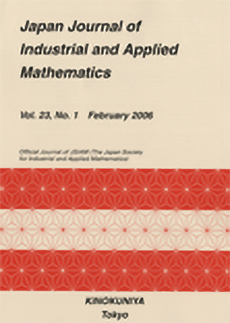Abstract
We consider modulated Poisson--Voronoi tessellations, intended as models for telecommunication networks on a nationwide scale. By introducing an algorithm for the simulation of the typical cell of the latter tessellation, we lay the mathematical foundation for such a global analysis. A modulated Poisson--Voronoi tessellation has an intensity which is spatially variable and, hence, is able to provide a broad spectrum of model scenarios. Nevertheless, the considered tessellation model is stationary and we consider the case where the modulation is generated by a Boolean germ-grain model with circular grains. These circular grains may either have a deterministic or random but bounded radius. Furthermore, based on the introduced simulation algorithm for the typical cell and on Neveu's exchange formula for Palm probability measures, we show how to estimate the mean distance from a randomly chosen location to its nearest Voronoi cell nucleus. The latter distance is interpreted as an important basic cost characteristic in telecommunication networks, especially for the computation of more sophisticated functionals later on. Said location is chosen at random among the points of another modulated Poisson process where the modulation is generated by the same Boolean model as for the nuclei. The case of a completely random placement for the considered location is thereby included as a special case. The estimation of the cost functional is performed in a way such that a simulation of the location placement is not necessary. Test methods for the correctness of the algorithm based on tests for random software are briefly discussed. Numerical examples are provided for characteristics of the typical cell as well as for the cost functional. We conclude with some remarks about extensions and modifications of the model regarded in this paper, like modulated Poisson--Delaunay tessellations.
Citation
F. Fleischer. C. Gloaguen. H. Schmidt. V. Schmidt. F. Schweiggert. "Simulation Algorithm of Typical Modulated Poisson--Voronoi Cells and Application to Telecommunication Network Modelling." Japan J. Indust. Appl. Math. 25 (3) 305 - 330, October 2008.
Information




